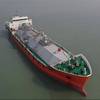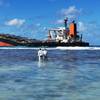GENEVA, September 9 (UNHCR) – The escalating death toll and harrowing survivors' tales in the Gulf of Aden have prompted UN refugee agency chief António Guterres to call for international action to stem the flow of desperate people crossing from Somalia to Yemen in rickety boats run by ruthless smugglers.
At least 150 people have died crossing the Gulf of Aden in the last three weeks. Twenty-five people were reported dead today off the coast of Yemen, while at least 75 bodies washed ashore last week after smugglers on four boats carrying some 400 people forced the passengers to jump overboard as they neared the coast. Many are still missing. Another 39 people were rescued from their drifting boat by a Danish ship on Wednesday night, but one man died before he could receive proper medical attention.
In the latest incident on Friday, two boats run by Somali smugglers and carrying about 120 people were found offshore by Yemeni coastal guards. Ten people were found dead in the engine room of one boat – two with their hands tied behind their backs. Two others died after being taken ashore. Survivors said another 13 had died during the voyage and their bodies thrown overboard. Many others on the boats were injured and 12 were reported to be in critical condition. Nearly all were suffering from thirst and hunger and several said they had been beaten by the smugglers, three of whom were arrested by the Yemenis. Survivors were taken to UNHCR's reception centre in Mayfaah, where they received medical and other assistance.
Every year, thousands of people cross the Gulf of Aden in unsafe vessels run by smuggling rings between the months of September and March, when the weather is generally calm in the area. Many of them set sail from Bossasso in north-eastern Somalia's Puntland region, trying to reach the Middle East and beyond in search of safety, refuge from persecution or simply better economic conditions. Hundreds are believed to be lost at sea every year, their deaths unreported. Those who survive the hazardous journey often arrive in Yemen, where UNHCR runs a reception centre and a camp.
"With the sailing season just starting, we cannot simply stand by for the next several months while hundreds or thousands more desperate people go to their deaths in the Gulf of Aden at the hands of smugglers," said High Commissioner Guterres on Friday. "The international community has to help –and put pressure on – local authorities in Puntland and Bossasso to crack down on the smugglers."
He added, "We need to get information to those being exploited by the smugglers as well, so they know the dangers. We're also appealing to international shippers to keep an eye out for boats in distress in the Gulf, and on governments in the region to do all they can to help those who need it on their shores."
On Wednesday night, the Danish tanker ship Eli Maersk rescued 39 Somalis and Ethiopians who had been drifting in the Gulf of Aden for several days after their boat engine failed. Two of the passengers were in critical condition and in urgent need of medical care. One woman had just delivered a baby, and all passengers were in dire need of water and food. One later died. The survivors are now getting help in Djibouti.
Guterres praised the captain and crew of Eli Maersk, and thanked Djibouti authorities for their help.
Yemen, one of the few countries in the region to have signed the 1951 Convention relating to the Status of Refugees, has been generous in receiving migrants and refugees. There are currently some 47,000 Somalis registered with UNHCR as refugees on a prima-facie basis in Yemen, but it is estimated that there are hundreds of thousands more in the country.
In a related development, UNHCR, with support from the European Commission, is organizing a two-day international meeting of experts on "Interception and Rescue-at-Sea in the Mediterranean," in Athens starting Monday, September 12. The meeting will bring together experts from most Mediterranean states, as well as representatives from the shipping industry, international organisations, non-government organisations and academia to discuss how to reconcile migration controls with refugee protection.
The meeting in Athens is expected to provide a series of concrete recommendations for a second meeting to be held in Madrid on October 17 and 18 which will bring together government representatives from all the Mediterranean coastal states.
Subscribe for
Maritime Reporter E-News
Maritime Reporter E-News is the maritime industry's largest circulation and most authoritative ENews Service, delivered to your Email five times per week










